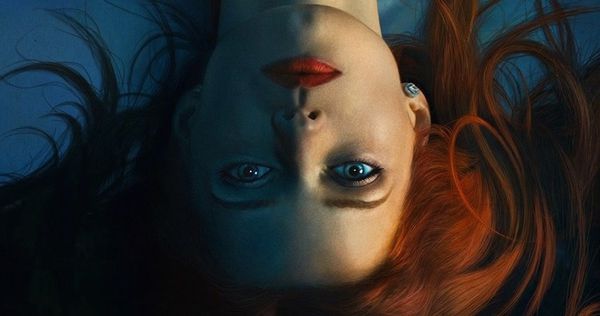Eye For Film >> Movies >> Elizabeth Harvest (2018) Film Review
Elizabeth Harvest
Reviewed by: Jennie Kermode

In real life, Abbey Lee is one of the world's most celebrated models. In character as Elizabeth, she retains her delicate, gazelle-like beauty: long legs, pert breasts, high cheekbones, big blue eyes. But Elizabeth, poorly educated though she is, understands that the appeal of physical beauty only goes so far. She adores Henry (Ciarán Hinds) in large part because of his intellectual brilliance, and she wonders aloud "Why would he want to marry a girl like me?"
The answer to this question goes far beyond anything this shy, sweet creature could imagine - and, indeed, she will have only a short time in which to try to figure it out, this time around. Henry is a modern Bluebeard, spiriting her away to his remote home and telling her that everything there is hers now - the clothes, the jewels, the money in the safe - but for the contents of one room. This room is his private space, somewhere she must never enter. Although other versions of the tale have spun this out, building tension as the heroine's curiosity grows, this one wastes no time. Elizabeth has a curious nature - and we all know what happened to the proverbial cat.

To say much more about the plot would be to diminish the film. What follows takes us firmly into the realms of science fiction but this is at heart a character-driven story, one styled around patterns and a lingering fear of predestination or of being cursed to repeat the mistakes of the past. Hinds is on fine form as the troubled doctor, telling his assistant Claire (the always reliable Carla Gugino) that he wants to be a better man yet somehow never quite putting in the effort required to take responsibility for his failings. His blind son Oliver (Matthew Beard) lurks in his shadow, clearly besotted with Elizabeth, afraid like so many young men out there that he will end up imitating his father's aggressive behaviour no matter what he does. But it's Lee who dominates the film in a performance that feels animal, instinctual. At a significant physical disadvantage and deprived of the intellectual tools that might otherwise have helped her, Elizabeth moves like a prey animal, those wide eyes full of fear, her whole body intensely alert. Though at first glance she might seem a helpless victim, she's geared for survival and her single-mindedness makes her compelling to watch.
There are some big structural problems with this film. Its non-chronological approach means twists that should intrigue are too likely to confuse instead, leaving viewers frustrated. It's unduly heavy on exposition, especially during a sequence in which we are read lengthy extracts from a journal. The core idea certainly has potential - at least if one is willing to set aside awareness of how actual biology works and accept that the driving force here is what people believe about how biology works - but as a writer, Sebastian Gutierrez is clearly out of his depth.
The result is very much a case of style over substance. The film is visually stunning, and not just because of the way that Lee captivates the viewer's gaze. The setting - Gothic this tale may be but the architecture is modern - is brilliantly used and all those clean lines heighten the horror by contrast at the same time as emphasising Henry's obsession with order and control. Here the chaos of biology is pitted against the patriarchal dependence on a disciplined world to striking effect.
Ultimately. reactions to this film are likely to be very varied. If a consistent and coherent narrative is essential to your enjoyment, you would be well advised to steer clear. If thematic development, performance and style mean more to you, you may well find it intriguing. The tragedy of it is that with just a little more work it might have worked in all these ways and been something truly special.
Reviewed on: 24 Mar 2019















